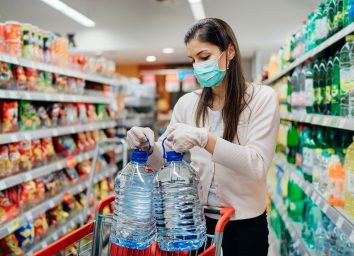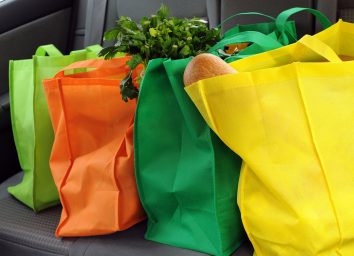This One Mistake Will Slow Down Your COVID-19 Recovery

There's a lot of talk about what your body goes through when you have COVID-19, but there's much less on what happens to your body while you recover from coronavirus. You should know that not only are there ways for you to be proactive about your recovery but that what you do during this recovery period can determine whether you will experience long-term consequences.
There is one overlooked treatment in particular that can slow down your recovery, but the good news is that it's something that's completely in your control: your diet. We consulted registered dietitian nutritionist Cordialis Msora-Kasago, MA, RDN, a Los Angeles-based national spokesperson for the Academy of Nutrition and Dietetics, to discuss how your diet plays a role in your susceptibility to COVID-19, your recovery, and the lasting impact the virus can have on your health.
After you've been diagnosed with coronavirus (or self-diagnosed by paying attention to these COVID-19 symptoms), don't make the mistake of forgetting about the essential role your diet will play in your recovery.
What are the most common nutrition-related health issues you can expect to experience during COVID-19?
On top of feely groggy, weak, and having trouble breathing, you should also expect to experience diet-related problems when you have COVID-19.
"People may not associate common COVID-19 symptoms such as fever, coughing, and difficulty breathing with nutrition, but they do indeed impact what and how one eats," explains Msora-Kasago. "An individual who is coughing or experiencing labored breathing may find chewing and safe swallowing difficult, making it hard to get enough nutrition."
"Further complicating the ability to eat well are the reported changes in taste and smell, general weakness and malaise, and medication-induced dry mouth. For some people who have been on a ventilator, [they may have difficulty swallowing]," she adds.
When it's uncomfortable to eat, you're more likely to become deficient in nutrients and suffer from issues that stem from that. "During and after treatment, people might experience poor appetite and consequent unintentional weight loss. That indicates that in addition to losing fluids, the body may be using fat and muscle for energy and normal body functions," says Msora-Kasago.
After battling coronavirus, you may or may not experience lasting health issues. "While many people who suffer COVID-19 do not have significant residual symptoms, some may experience long term lung damage, cardiomyopathy, and/or organ failure that may require changes in the diet to manage symptoms," says Msora-Kasago.
STAY INFORMED: Sign up for our newsletter to get the latest coronavirus foods news delivered straight to your inbox.
How does your diet play a role in COVID-19 recovery?
When you're battling coronavirus, your body experiences higher levels of inflammation, dehydration, and lower levels of essential micro and macronutrients, to name a few symptoms.
That's why, during recovery, it's important to replenish those lost nutrients and decrease inflammation. "Studies indicate that malnutrition […] impacts recovery time and increases risk of complications," says Msora-Kasago. "In addition to helping the body maintain a healthy weight and stay strong, good nutrition provides the nutrients needed to optimize the immune system and aid in recovery."
The advice to focus on your diet post-coronavirus applies to everyone, but if you have preexisting conditions, it's particularly important for you to pay attention to what you eat.
"There is convincing evidence that people with underlying conditions such as diabetes, obesity, hypertension, and chronic lung disease experience worse outcomes than those that do not have such conditions," says Msora-Kasago.
How can you best change your diet to fit your health needs post-coronavirus?
If it is within your means to do so, it is recommended to consult a registered dietitian nutritionist to assess the best path forward. If you are hospitalized with COVID-19, there are dietitians in the hospital who can help you make a nutrition plan.
One of the first steps to recovery is to conduct a complete nutrition assessment. "This may include a review of biochemical data and the completion of a nutrition-focussed physical assessment to identify potential nutrient deficiencies," explains Msora-Kasago.
"By conducting a complete nutrition assessment […] the registered dietitian nutritionist develops personalized nutrition plans that ensure that an individual gets adequate nutrition to help the body recover and stay strong during the rehabilitation process," she adds. "In addition to emphasizing nutrient density, these plans take into consideration food preferences, health status, and access to foods."
Some of the recommended treatments when recovering from COVID-19 may include fortifying food with nutrients so that each bite taken is nutrient-dense or using an oral nutrition supplement to increase the nutritional intake.
At the end of the day, thank your body for fighting through coronavirus, and take care of it by doing everything you can to help it heal properly. The best part? You get to eat healthy foods to do that!








